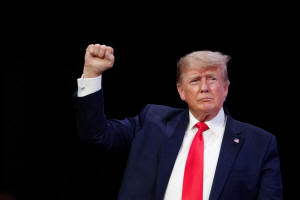Explainer-What charges could Trump face over efforts to overturn the
2020 election?
 Send a link to a friend
Send a link to a friend
 [June 24, 2022]
By Luc Cohen [June 24, 2022]
By Luc Cohen
NEW YORK (Reuters) - The U.S. congressional
committee probing the Jan. 6, 2021, assault on the U.S. Capitol has
sought in hearings this month to build a case that then-President Donald
Trump's efforts to overturn his 2020 electoral defeat amounted to
illegal conduct.
Trump said in a June 14 statement that the committee was "lying to the
nation," conducting a "sham investigation." What charges might
prosecutors bring against Trump and how might he defend himself?
Here are some ideas being floated right now:
OBSTRUCTING AN OFFICIAL PROCEEDING
In a March 2 court filing, the committee detailed Trump's efforts to
persuade then-Vice President Mike Pence to either reject slates of
electors for Joe Biden, who won the election, or delay a congressional
count of those votes.
The president's efforts likely violated a federal law making it illegal
to "corruptly" obstruct any official proceeding, or attempt to do so,
said Andrew Carter, the California federal judge overseeing the case.

"The pressure on Pence alone is enough" for prosecutors to prove Trump
obstructed the proceeding, said Barbara McQuade, a law professor at the
University of Michigan and a former federal prosecutor.
CONSPIRACY TO DEFRAUD THE UNITED STATES
The committee submitted the court filing as part of its effort to force
Trump adviser John Eastman to hand over documents.
The filing said it was likely that Trump and others conspired to defraud
the United States, which criminalizes any effort by two or more people
to interfere with governmental functions "by deceit, craft or trickery."
In addition to Trump's efforts to pressure Pence, the committee cited
his attempts to convince state election officials, the public and
members of Congress that the 2020 election was stolen, even though
several of his allies told him there was no evidence of fraud.
TRUMP'S DEFENSE
Trump has repeatedly denied doing anything illegal in connection with
the Jan. 6 events.
If the Justice Department brings charges, prosecutors' main challenge
will be proving that Trump acted with corrupt intent, experts said.
Trump could argue he sincerely believed that he won the election and
that his well-documented efforts to pressure Pence and state election
officials were not meant to obstruct Congress or defraud the United
States, but to protect the election's integrity.
[to top of second column]
|

Former U.S. president Donald Trump speaks to an audience at the
"American Freedom Tour" event in Memphis, Tennessee, U.S., June 18,
2022. REUTERS/Karen Pulfer Focht/File Photo

"It's not whether a reasonable person would believe
it, it's did this person intend it, did this person know it," said
Daniel Medwed, a law professor at Northeastern University in Boston.
"It's like an escape hatch for the naïve and the deluded."
Spokespeople for Trump did not respond to a request for comment.
DOES ALL THIS MEAN TRUMP WILL BE CRIMINALLY CHARGED?
No. Neither Carter nor the committee can charge Trump with federal
crimes. That decision must be made by the Justice Department, led by
Attorney General Merrick Garland.
The department is conducting its own sprawling investigation of the
Jan. 6 events, but has not signaled whether it intends to indict
Trump, a decision that could have enormous political consequences as
Trump weighs another run for the presidency in 2024. The department
did not respond to a request for comment.
ARE ANY OTHER CHARGES POSSIBLE?
While not mentioned in the committee's court filing, experts said
there may be evidence to prove that Trump committed wire fraud or
seditious conspiracy.
Democrats said in a hearing last week that the Republican Trump
raised some $250 million from supporters to advance fraudulent
claims in court that he won the election, but steered much of the
money elsewhere. This raises the possibility that he could be
charged for wire fraud, which prohibits obtaining money on "false or
fraudulent pretenses," legal experts said.
"Did he know and intend that the money really wasn't going to be
spent for an election defense fund, but was actually going to be
spent for other purposes?" said Ilya Somin, a law professor at
George Mason University in Arlington, Virginia. "It's very likely
the answer is yes."

Prosecutors have charged more than a dozen members of the far-right
Proud Boys and Oath Keepers groups who were among the thousands of
Trump supporters to storm the Capitol on Jan. 6, with seditious
conspiracy, a rarely used statute that makes it illegal to overthrow
the U.S. government by force.
It would be challenging for prosecutors to tie Trump to the physical
force used by some supporters, McQuade said.
(Reporting by Luc Cohen in New York; Editing by Noeleen Walder and
Howard Goller)
[© 2022 Thomson Reuters. All rights
reserved.]
This material may not be published,
broadcast, rewritten or redistributed.
Thompson Reuters is solely responsible for this content. |